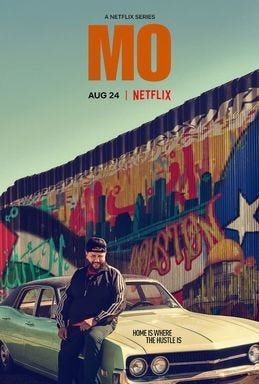Created and written by Mo Amer and Ramy Youssef, the Netflix television show “Mo” is an engaging and very funny representation of the melting pot that is the United States of America. Amer stars as the titular character, Mohammad Najjar, a Palestinian refugee living in Houston, Texas. Like Amer in real life, Najjar has lived in the U.S. since he was 9 years old. He is fluent in English, Arabic and Spanish. He’s a hustler, making money through any number of legal and quasi-legal ways, including selling designer knock-off clothes and shoes from the trunk of his classic 1970 Ford Fairlane. When the first season begins, Mo is in his second decade of trying to obtain legal refugee status in the U.S.
The first season of this show debuted in August, 2022. The second, and apparently final, season premiered on January 30, 2025. Mo Najjar is certainly a flawed character, too confident and frenetic for his own good. He consistently leaps before he looks, resulting in multiple conflicts, some funny, some deadly serious. The childhood trauma of fleeing Palestine and then Kuwait with his family, and losing his father in the process, has left Mo with emotional issues that Amer plays with understanding and unexpected subtlety. Mo is also a character practically bursting with good will toward his fellow man. He is a friendly teddy bear of a son, brother and friend, prone to overpowering hugs and hilarious conversational outbursts. But he is also never more than a moment away from an angry confrontation, often as an overreaction to the restrictions and roadblocks that America constantly places in his way.
The show’s writers do an impressive job of depicting the lives of immigrants in the American Southwest. While they focus on Mo and his family, both in the U.S. and in Palestine, the show does a fine job of illustrating the challenges and triumphs of Mexican- and African-Americans, as well. A strength of the show is its depiction of Mo’s friendships with his “brothers,” his buddies of various nationalities and religious beliefs. The show paints a picture of an America to aspire to, one that allows individuals to worship and believe what they want, while loving and respecting others based on their shared humanity. This is particularly well-done in the depiction of Mo’s relationship with his girlfriend, Maria, the Mexican-American owner of a small auto repair shop. Their interaction reveals a couple who respect each other’s traditions without allowing those differences to negatively affect the relationship (although there are plenty of other issues that DO affect that relationship).
Season Two culminates in Mo’s travels, along with mother and brother, to his homeland of Palestine, a place he hasn’t seen since he was a young child. Although the final episodes continue to provide humor, they become more sober as Mo visits with family members he’s only seen online over the years. He is affected by observing the day-to-day lives of Palestinians confronted with the petty intimidations and harsh restrictions imposed by Israeli authority. At the same time, he revels in the joy and support that his extended family’s community provides, while also learning about (and seeing) his mother and his father in better times.
“Mo” was recommended to me by my own father who, in his retirement, has become an endless font of TV suggestions, some good, some bad. He knocked this one out of the park. The character of Mo, with his chameleon-like ability to speak and relate to all kinds of people in their own language, (figuratively and literally), strikes a wonderful chord. The show’s finale left me with a pragmatic optimism about the world that I don’t often feel these days. Highly recommended (5/5 Egg Burritos with Sour Cream).
Tom Polacek (February, 2025)




